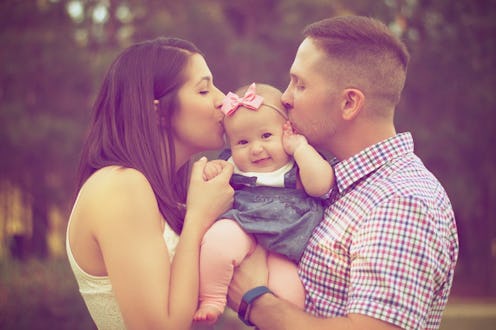The worry about the best age to have kids hangs over a lot of women. We're constantly reminded that our ovaries burst into flames when we turn 30. Or something like that. And it can have a huge effect on our life decisions. But research shows that we may be starting to buck the trend.
The Centers for Disease Control released preliminary numbers that showed birth rates of 103 for every 100,000 for women between 30 and 34. But interestingly, the number for females 25 to 29 was only 102 per 100,00. That means that women are having more children in their early 30s than in their late 20s— and that's something new. In part, experts think it's linked to marriage being pushed back later in life, but maybe we're also just losing our fixation with the biological clock a little.
Because as much as we're obsessed with age, it's important to remember that there are other factors that shape our fertility, too. Some of it is just down to our genes. "Certainly genetics have a lot to do with diagnoses like Premature Ovarian Insufficiency, Polycystic Ovarian Syndrome, Endometriosis, and Hyperprolactinemia," integrative women's health and fertility expert Debra Gerson, tells Bustle can all affect fertility. "However, we are seeing more lifestyle and environmental influences on fertility ... [such as] poor lifestyles with too little sleep and too much caffeine.
And your period may be an indicator, too. "Don't forget, your period is stage one of baby-making, so it's indicator of what's going on with your fertility — no matter what your age. "If you have clockwork periods and you get premenstrual symptoms like breast tenderness, bloating, and cramping, it means that you have ovulatory cycles," NYC-based OBGYN Dr. Adeeti Gupta tells Bustle.
That being said, obviously age does affect your fertility. But how much? Here's what you need to know.
1Your Fertility Doesn't Drop Off At 30
Fertility does decline in your 30s and if having your own children is important to you, you may not want to ignore that fact. But it's not like falling off a cliff face. "Fertility starts to naturally decline probably as early as age 32, but we don’t really notice it until 35," Alyssa Dweck, M.D., gynecologist in New York, assistant clinical professor OBGYN at Mt. Sinai School of Medicine, and author of V is for Vagina, tells Bustle.
2But If You're Trying, You Should Get Checked
One of the ways age affects your fertility is that, if you're trying to conceive but unsuccessful, you need to get it checked out more quickly. "Even though a woman may appear to be super fertile, we recommend being evaluated after one year of unprotected intercourse in women under the age of 35, and six months in women over 35," Gerson says.
390% Of Women Trying To Conceive Will Do So In Two Years — And Yes, That Includes Women In Their 30s
And... breathe out. Yes, a lot of women do have trouble getting pregnant and it can be incredibly traumatic for them. But don't be fooled into think that it's a nightmare for everyone. The CDC says that 94 percent of American women are fertile and 89 percent will have no problem conceiving. Not only that, the British Pregnancy Advisory Service found that nine out of 10 women aged 19-39 would conceive within two years of trying. So it's not as bleak as you might think.
4More Options Means More Women Are Waiting
"In my practice I see many women who choose to wait to have children," Dr. Jennifer Caudle, Family Physician, Assistant Professor at Rowan University School of Osteopathic Medicine, tells Bustle. "Some of my patients say that they want to finish their education or get established in their career before having children. Others state that they haven't found the right partner to have children with. Regardless of the reason, many of my patients feel comfortable delaying pregnancy because of options that are available to preserve fertility — such as egg freezing. Whatever the reason, as a family physician, I treat many female patients who choose to wait to have children, for various reasons."
You're the only person who can decide when and if you should start trying for a baby. But before you start listening to scaremongering, it's important that you know the facts and talk to your doctor.
